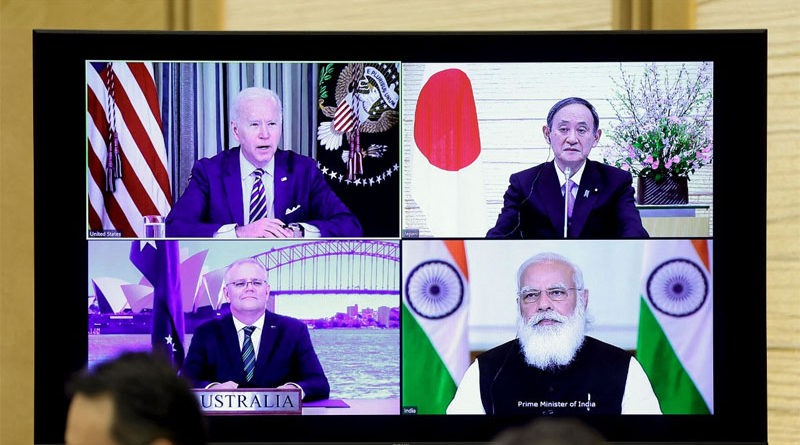QUAD Vows To Keep Region ‘Free & Secure’
Mar 13, 2021
NEW DELHI: Sending a strong message to China, the QUAD in its first summit signalled its arrival on the geopolitical scene with PM Modi describing the grouping as a “force for global good” and an “important pillar of stability” in the Indo-Pacific. In his opening remarks, he underlined the evolution of the group and a shedding of inhibitions India may have harboured in the past. “We will work together, closer than ever before, for advancing our shared values and promoting a secure, stable and prosperous Indo-Pacific,” he said.
Modi’s comments came after US President Joe Biden invited him to speak, observing, “PM Modi, good to see you”.
The discussions sent a potent message to China that its actions have brought together a committed group of democracies supporting values of pluralism and free access in a region which Beijing likes to see as its backyard.
“The summit, by itself, is the most significant outcome,” foreign secretary Harsh Shringla, who is also the sherpa for the QUAD from the Indian side, said.
“The QUAD leaders emphasised the commitment to a free and open, prosperous and secure Indo-Pacific,” he added.
China seems to have been angered by the developments with Global Times, the Chinese mouthpiece, saying India was becoming a “negative asset” for BRICS and SCO. “India has become a negative asset of these groupings.
China in February said it is backing India to host the 2021 BRICS summit. It seems India has failed to understand China’s goodwill. India takes all support from China for granted. It is, in fact, carrying out a kind of strategic blackmail against China,” the paper said.
The QUAD’s faith in market-based economies and readiness to put forward a “positive agenda” in the region was emphasised in an ambitious target of producing a billion doses of the anti-Covid vaccine. There would be no talk of a ‘Cold War’ with China but the QUAD would project power in a way distinct from the communist giant, seemed to be the summit’s political upshot, with Biden making it evident that he does not differ from the Trump administration on the Indo-Pacific and QUAD. Underlining the convergence, the summit was followed by a joint statement.
“The summit, by itself, is the most significant outcome,” foreign secretary Harsh Shringla, who is also the sherpa for the QUAD from the Indian side, said.
“The QUAD leaders emphasised the commitment to a free and open, prosperous and secure Indo-Pacific,” he added.
Japanese PM Yoshihide Suga tweeted that he had opposed China’s unilateral efforts to change the status quo, as well as the situation in Myanmar. He is the first QUAD leader to directly say China’s actions came under criticism at the summit.
Hosted by the US, the summit threw up several outcomes — first, a massive vaccine initiative that will use the strengths of all four countries to produce a billion doses of Covid vaccines that would be used for the good of Indo-Pacific countries for a start. Briefing journalists after the summit, Shringla said, “It is an ambitious target but we believe we can do it.
The initiative will expand India’s own vaccine manufacturing capabilities, so that India’s domestic demands are not affected. The initiative will use vaccines developed in the US — the Johnson & Johnson one to begin with — and those manufactured in India, financed by US and Japan. Australia will use its logistics to build last mile connectivity to countries in southeast Asia, Pacific islands and Indian Ocean countries. For the first time, a joint statement was issued, signalling a greater alignment.
The QUAD set up three expert level working groups on vaccines, critical and emerging technologies and climate change. Australian PM Scott Morrison tweeted, “For us, this meeting is about how we keep Australia and the Indo-Pacific region we live in safe, stable and secure.”
Myanmar came up for discussion, where Modi stressed the close relations India had with the neighbour and said would be working “constructively” to bring it back on the path to democracy. “We advocate a constructive approach, take into account the needs of the people of Myanmar,” Shringla said.
The QUAD also explored the possibility of cooperating with some countries in Europe like France, Germany and Netherlands which had declared Indo-Pacific policies of their own. “But there is no talk about expanding the QUAD,” Shringla said.
Courtesy: TOI

